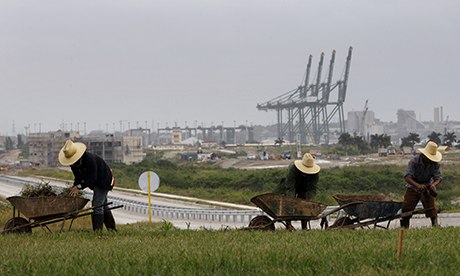
In Spain, Cuban official invites investors
In Madrid on Thursday (June 26), Cuba’s deputy minister of Foreign Trade and Investment, Ileana Núñez Mordoche, invited representatives from more than 160 Spanish businesses to invest in Cuba.
At the meeting, hosted by the Council of Spanish Chambers of Commerce, Núñez explained the new Law on Foreign Investment, passed in March, and touted the Mariel Special Development Zone, a site designed to attract foreign capital and promote the island’s economic development.
According to Núñez, the sectors that offer the greatest opportunities to Spanish companies are agroindustry, biotechnology, bottling and packaging, light industry and tourism.
Spain is one of Cuba’s main trading partners and a key source country for foreign direct investment, Núñez noted, pointing out that her country is looking to attract foreign capital as part of efforts to “update” its socialist economic model.
The goal of the Law on Foreign Investment is to reduce Cuban imports, promote exports and bolster industry through infrastructure build-outs and technology inflows, the deputy minister said.
She described infrastructures and renewable energy as priorities for her government and said they were open to foreign capital.
“We must change the energy matrix, with more space for renewables and biomass,” Núñez said.
The Council’s chairman, Manuel Teruel Izquierdo, said that the Mariel Zone is “a pole of attraction” for Spanish investment and “opens the possibility that new companies, major companies may enter the island.”
“The principal agents of our relationship with Cuba have been the Spanish PYMES,” Terual said, using the acronym for Small and Medium Enterprises. “The time has come to take the big Spanish corporations into the Cuban market.”
During the meeting, others in the Cuban delegation acquainted the audience with the Mariel Zone, about 27 miles west of Havana. They said it promotes and protects enterprises and industries that produce innovative goods and services with added value, using clean technologies.
Some of the measures adopted by Cuba to attract foreign investment include fast approval for business incorporation, tax benefits and special guarantees, they said.
Cuba’s director general for foreign investment, Deborah Rivas, added that there is a “favorable climate” for foreign direct investment in Cuba and pointed out that the island is a signatory to various trade-promotion and investment-protection treaties under the World Trade Organization and other entities.
The new law allows foreign companies to form joint ventures with Cuban entities or create enterprises that are 100 percent foreign-owned.
It sharply reduces the profits tax for foreign investors from 35 percent to 15 percent and exempts them from paying it for the first eight years of business activity.
Further incentives to Spanish investors, the Cuban visitors said, are Cuba’s “political and social stability, a high level of training and qualification of its manpower, a high level of safety, and a strategic location” in the Caribbean.
So far, Cuba has received 44 applications from Spain for presence in the Mariel Zone.
The high-powered Cuban delegation included Yanet Vásquez, associate director of the Mariel Zone; Celia Labora, director of international relations for the Cuban Chamber of Commerce; Adriana Barceló, director of industrial management of the Ministry of Industry; José Daniel Alonso, director of business for the Ministry of Tourism; and Vivian Hitchman, director of regulation and control for the Ministry of Energy and Mines.
Cuba’s ambassador to Spain, Eugenio Martínez Enríquez, was also present.
The 160-plus Spanish businessmen attending the presentation represented the sectors of construction, finance, infrastructure, farm foods, engineering, logistics, sanitation, tourism, wine production, and air transportation, among others.


